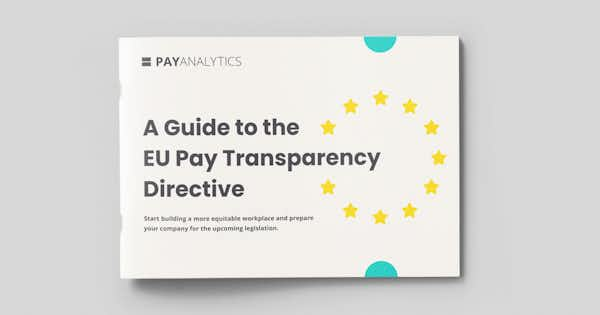Förberedelser inför EU:s direktiv om lönetransparens | Ladda ner vår e-bok gratis
Mäta

Rättvisa löner analys
Löneutjämning hjälper till att klargöra lönestrukturer genom att identifiera faktorer som driver kompensationen, vilket möjliggör informerade beslut och självsäker framsteg.
Översikt över alla produktfunktioner
Uppfyll dina mål för löneutjämning med PayAnalytics-programvaran. Den är utformad för att få dig igång med minimal konfiguration – stödd av videor och lättillgänglig dokumentation.
Rättvisa löner analys
Avslöja faktorer som påverkar lönen, fatta informerade beslut.
Lönekartläggning
Jämför olika jobb utifrån principen "lika lön för lika arbete av lika värde".
Personalanalys
Granska och förbättra mångfalden, vägled DEI-ansträngningar effektivt inom din organisation.
Avhjälpande åtgärder
Få skräddarsydda rekommendationer för att stänga löneklyftor, anpassade efter dina behov och budget.
Rapporter
Essentiella verktyg för global efterlevnad och anpassningsbara rapporter för ledningen.
Löneassistent
Hjälpa till att upprätthålla en fördomsfri arbetsplats genom att säkerställa goda lönebeslut.
Hantering av data
Finputsa importerade data enkelt i PayAnalytics med korrigeringar, redigeringar och tillägg för att säkerställa noggrannhet och synlighet.
Arbetsvärdering
Bygg objektiva kompensationsstrukturer, jämför olika roller baserat på organisationsvärde.
Styrning av användaråtkomst
Finkorniga åtkomstkontroller, eftersom användare har olika behov av dataåtkomst.

En guide till EU:s direktiv om lönestransparens.
Är du redo för EU-direktivet? Vi har satt samman en e-bok för att hjälpa dig att lära dig om de nya kraven.
Översikt över resurser
Vi har sammanställt ett kunskapscenter för att hjälpa dig navigera bland allt som rör löneutjämning, DEI och arbetskraftsanalys. Det inkluderar artiklar, nedladdningsbara e-böcker, podcaster med mera.
Guider och e-böcker
Utforska våra praktiska guider som ger dig råd om hur du uppnår rättvisa på arbetsplatsen. De kommer i form av långformiga artiklar och nedladdningsbara e-böcker.
Artiklar och bloggar
Håll dig informerad om löneutjämning, transparens, arbetsplatsrättvisa, kommunikationsstrategier och aktuella trender.
Lokala krav
Håll koll på den föränderliga lagstiftningen och upptäck vilka regler som kan gälla för dig.
Podcasten Coffee Talk
Senaste nyheterna om löneutjämning på bara 8 minuter – varannan fredag med Margrét & Henrike.
Kundframgångshistorier
Läs om hur företag har stängt löneklyftan med PayAnalytics.

PayAnalytics förvärvat av beqom
PayAnalytics announced its acquisition by beqom, a leading total compensation and performance management solution provider.
Om oss
Vi tror att lön är mer än en siffra. Vår programvara är byggd på över ett decennium av forskning och utveckling av prisbelönta professorer, experter på löneutjämning och ingenjörer.
Karriär
Join our passionate and highly skilled team. We are pioneers in our field, aiding companies in establishing fair workplaces.
Nyheter
Gå med i vårt passionerade och högt kvalificerade team. Vi är pionjärer inom vårt område och hjälper företag att etablera rättvisa arbetsplatser.
Varumärke
Få en översikt över vårt varumärke, utmärkelser och historia. Här hittar du nedladdningsbara varumärkesresurser och foton.
Partnerskap
Vi samarbetar med olika partners för att främja transparens och rättvisa i lönepraxis. Utforska samarbetsmöjligheter.
Konsulttjänster
Skräddarsydda konsulttjänster för implementering av lönerättvisa, utformade för att komplettera och stärka användningen av vår programvara.
Översikt över alla produktfunktioner
Uppfyll dina mål för löneutjämning med PayAnalytics-programvaran. Den är utformad för att få dig igång med minimal konfiguration – stödd av videor och lättillgänglig dokumentation.
Rättvisa löner analys
Avslöja faktorer som påverkar lönen, fatta informerade beslut.
Lönekartläggning
Jämför olika jobb utifrån principen "lika lön för lika arbete av lika värde".
Personalanalys
Granska och förbättra mångfalden, vägled DEI-ansträngningar effektivt inom din organisation.
Avhjälpande åtgärder
Få skräddarsydda rekommendationer för att stänga löneklyftor, anpassade efter dina behov och budget.
Rapporter
Essentiella verktyg för global efterlevnad och anpassningsbara rapporter för ledningen.
Löneassistent
Hjälpa till att upprätthålla en fördomsfri arbetsplats genom att säkerställa goda lönebeslut.
Hantering av data
Finputsa importerade data enkelt i PayAnalytics med korrigeringar, redigeringar och tillägg för att säkerställa noggrannhet och synlighet.
Arbetsvärdering
Bygg objektiva kompensationsstrukturer, jämför olika roller baserat på organisationsvärde.
Styrning av användaråtkomst
Finkorniga åtkomstkontroller, eftersom användare har olika behov av dataåtkomst.
Översikt över resurser
Vi har sammanställt ett kunskapscenter för att hjälpa dig navigera bland allt som rör löneutjämning, DEI och arbetskraftsanalys. Det inkluderar artiklar, nedladdningsbara e-böcker, podcaster med mera.
Guider och e-böcker
Utforska våra praktiska guider som ger dig råd om hur du uppnår rättvisa på arbetsplatsen. De kommer i form av långformiga artiklar och nedladdningsbara e-böcker.
Artiklar och bloggar
Håll dig informerad om löneutjämning, transparens, arbetsplatsrättvisa, kommunikationsstrategier och aktuella trender.
Lokala krav
Håll koll på den föränderliga lagstiftningen och upptäck vilka regler som kan gälla för dig.
Podcasten Coffee Talk
Senaste nyheterna om löneutjämning på bara 8 minuter – varannan fredag med Margrét & Henrike.
Kundframgångshistorier
Läs om hur företag har stängt löneklyftan med PayAnalytics.
Om oss
Vi tror att lön är mer än en siffra. Vår programvara är byggd på över ett decennium av forskning och utveckling av prisbelönta professorer, experter på löneutjämning och ingenjörer.
Karriär
Join our passionate and highly skilled team. We are pioneers in our field, aiding companies in establishing fair workplaces.
Nyheter
Gå med i vårt passionerade och högt kvalificerade team. Vi är pionjärer inom vårt område och hjälper företag att etablera rättvisa arbetsplatser.
Varumärke
Få en översikt över vårt varumärke, utmärkelser och historia. Här hittar du nedladdningsbara varumärkesresurser och foton.
Partnerskap
Vi samarbetar med olika partners för att främja transparens och rättvisa i lönepraxis. Utforska samarbetsmöjligheter.
Konsulttjänster
Skräddarsydda konsulttjänster för implementering av lönerättvisa, utformade för att komplettera och stärka användningen av vår programvara.

Artiklar och bloggar
Här hittar du en omfattande samling av artiklar dedikerade till att främja arbetsplatsens rättvisa, lönetransparens och mångfald, rättvisa och inkludering (DEI)-praktiker. Från praktiska råd om att navigera i löneutjämningslagar i olika länder till djupgående analyser av beräkningar av könsbaserade löneklyftor och fördelarna med rättvisa lönepraktiker för att attrahera och behålla talanger, är våra resurser utformade för att stödja organisationer och individer som är engagerade i att göra meningsfulla framsteg mot jämlikhet på arbetsplatsen.
- Artikel
You’ve made the commitment to equal pay and you’re ready for your first pay equity analysis. But what data do you need? This article breaks down the bare data essentials and the helpful additions.
- Artikel
In January of 2023, the EU enacted a new directive: the Corporate Sustainability Reporting Directive, or CSRD. With roots in the EU Green Deal, this legislation modernizes rules around the information on sustainability, both social and environmental, that companies have to report.
- Artikel
In a climate of pay secrecy, employers may perceive pay transparency as a challenge or even a risk. But pay transparency delivers major employer benefits including improved performance, reduced pay discrimination, and better recruitment. This article explains the benefits of pay transparency, pay transparency laws, and how transparency can be a tool for positive change in the workplace.
- Artikel
Discover our top takeaways from WorldatWork’s Total Rewards ‘23 conference. Learn how organizations can foster fairness, prioritize employee well-being, and leverage data-driven strategies for optimized total rewards.
- Artikel
What do people analytics, ESG reporting, the metaverse, and employee retention have in common?
- Artikel
Algorithmic people analytics tools promise to make hiring and promotion decisions easier. However, these tools can sometimes end up recommending biased decisions. So what is an HR professional to do? Join PayAnalytics co-founder Margrét at the WorldatWork Total Rewards conference in San Diego for some real-world insight into how to apply people analytics tools fairly.
- Artikel
Reforms to Australia’s Workplace Gender Equality Agency (WGEA) have expanded the scope of pay gap data reporting. By 2025, new reporting requirements will lead to personalized pay gap reports for each employer.
- Artikel
In Maryland, the Equal Pay for Equal Work Act not only prohibits gender-based pay discrimination but also has several transparency requirements. These include providing the pay range to applicants on request and a prohibition against asking for salary history. The law also protects employees’ rights to discuss their pay.
- Artikel
From the time the EU pay transparency directive was only draft legislation, PayAnalytics has been tracking its requirements and making corresponding updates to our software solution. Through expanded capabilities and some new features, we’re helping our clients get compliant and stay compliant with the directive’s analysis, reporting, and pay transparency requirements.
- Artikel
In 2021, the US state of Connecticut passed a new pay transparency law with four major parts: equal pay for comparable work, wage range disclosure in job postings, ban on seeking/using an employee’s wage history, and freedom to discuss pay.
- Artikel
Pay equity is important in companies of all sizes. Yet organizations with small populations face unique challenges when conducting a pay equity analysis. This article reviews some of these concerns and ways to address them.
- Artikel
The US state of Colorado is progressive in its pay transparency legislation. Since 2021, its legislation has mandated equal pay, required pay transparency in job postings and hiring/promotion processes, and protected employees’ right to discuss their pay.
Prenumerera på vårt nyhetsbrev
Vårt nyhetsbrev tar upp ämnen som jämlik lönesättning, kompensation och förmåner, DEI (mångfald, jämlikhet och inkludering) samt lagändringar och även nyheter om vårt företag och uppdateringar av programvaran.











